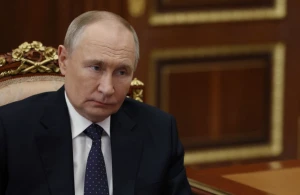
Ukrainian prisoners of war kept "on brink of death," says head of Azov's Angels
Olena Tolkachova, the head of the Azov's Angels Patronage Service, stated that the exchange of Ukrainian prisoners of war held in Russian colonies is a humanitarian issue
She discussed this on Espreso TV.
“This is a humanitarian issue because it involves saving the lives of those who are under great threat. This includes the defenders of Azovstal, the Azov soldiers, other patriotic units, as well as the seriously wounded and women,” she said.
Olena Tolkachova also provided an estimate of the number of Azov soldiers in Russian captivity.
“There are about a thousand soldiers from Military Unit 3057 of the National Guard, which is now known as the 12th Azov Brigade, under our care. This includes around 700 from the Azov Regiment, which was a regiment at the time of the Azovstal withdrawal. If I’m not mistaken, the total number of Azovstal defenders who left was approximately two thousand. The exact number still in captivity is better known to the coordination headquarters for prisoner management,” said Tolkachova.
She also mentioned that the Russians have a “special” attitude towards Azov soldiers and Azovstal defenders, placing them in the harshest conditions.
“Our prisoners are dispersed throughout Russia, and conditions vary widely depending on the facility. However, Azov fighters and Azovstal defenders are often held under the worst conditions and sent to the most severe colonies and prisons. This includes inadequate medical care for those who were injured defending Azovstal two years ago and are still in captivity.
It’s not that there are inhumane conditions there — there are simply no conditions at all. There are some colonies with relatively normal conditions. I hope the treatment depends on which specific colonies our boys and girls were sent to.
But I should note that Azov fighters are treated differently. It’s not just a matter of torture; access to food, medical care, drinking water, and proper sleeping arrangements is almost nonexistent for them. They are simply kept in a state of life ‘on the brink of death.’ We have documented cases, which have been covered in the media, where unfortunately, we are losing our soldiers — dying from torture, diseases, untreated wounds, hunger, and lack of drinking water,” said Olena Tolkachova.
-
Danielle Bell, the head of the UN Human Rights Monitoring Mission in Ukraine, reported that over 95% of Ukrainian prisoners of war were tortured in Russia.
- News














































